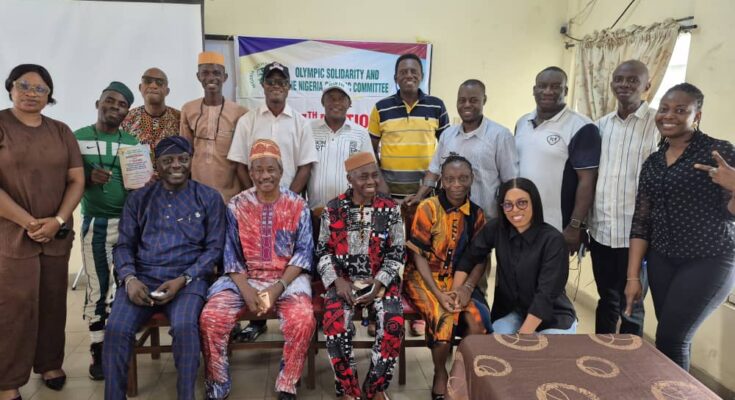The recently concluded 3rd Module of the International Olympic Committee and Nigeria Olympic Committee (IOC/NOC) Advanced Sports Management Course (ASMC) at the University of Ibadan marked a significant development in the professionalisation of sports management in Nigeria.
Organised by the Nigeria Olympic Committee (NOC) from May 5 to May 9, 2025, this module was hinged on two critical aspects of sports management — finance and marketing.
The key expert facilitation was the course was facilitated by esteemed professional IOC Directors, Prof. Clement Fasan and Dr Jonathan Dyagas, whose expertise lent considerable academic depth to the sessions.
Again the involvement of external facilitators, Mr Tunji Adeyinka and Mrs Bodunrin Olanipekun, further diversified the learning experience, providing the participants with practical insights and real-world applications.
Virtual Engagement: The hybrid format adopted during the training by incorporating both in-person and online participation, reflects an adaptive approach to education, particularly relevant in this post-pandemic era.
This allowed for broader participation while enabling remote experts to contribute without logistical constraints.
Case Study Presentations: One of the module’s unique features was the emphasis on individual case study presentations, encouraging participants to apply theoretical concepts to practical scenarios in their organisations.
This interactive format not only fostered engagement but also allowed participants to showcase their learning outcomes.
Diverse Participation: With 24 participants from various sectors o directors of state sports councils and esteemedf sports management, including academic professionals, the module fostered a collaborative learning environment.
The diverse backgrounds of participants likely enriched discussions, contributing to a well-rounded educational experience.
Focus on Essential Skills: By centring discussions on finance and marketing, which are vital to sports organisations’ success, the course addressed current challenges facing the industry in Nigeria.
The ability to manage finances effectively and engage in strategic marketing was crucial for attracting sponsorship, enhancing public engagement, and ensuring sustainability in sports programmes.
Implications for Nigerian Sports Management
The successful completion of the ASMC’s 3rd Module underscored a commitment to enhancing the capacity of sports administrators in Nigeria.
This course aligns with global best practices in sports management and is essential for fostering a culture of professionalism within the country’s sports sector.
Moreover, as the Nigerian sports landscape becomes increasingly competitive, equipping managers with the necessary skills to navigate financial complexities and market dynamics is imperative.
Enhanced knowledge in these areas can lead to greater organisational success, improved performance on the international stage, and more effective utilisation of resources.
The 3rd Module of the IOC/NOC Advanced Sports Management Course represented a vital step toward achieving a more professional and efficient sports management framework in Nigeria.
By fostering the development of critical skills among sports administrators, the NOC is not only addressing immediate industry challenges but also laying the groundwork for a thriving sports culture.
Continued investment in such educational initiatives will be crucial for the advancement of Nigerian sports, ensuring that stakeholders are well-prepared to meet future demands and capitalise on emerging opportunities.
Tony Nezianya is the Public Relations Officer of the Nigeria Olympic Committee. He can be reached via [email protected].

